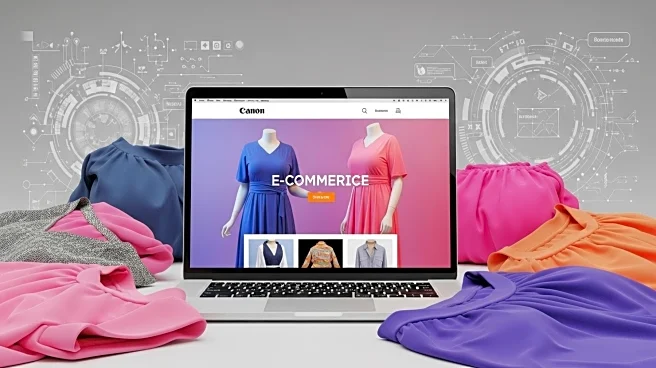What's Happening?
Plus-size entrepreneurs are increasingly utilizing e-commerce platforms and technological innovations to address fit issues and enhance customer experience. E-commerce accounts for approximately 15-16% of total U.S. retail sales, providing a significant opportunity for direct-to-consumer fashion brands. These entrepreneurs are leveraging AI-driven size recommendations and virtual try-ons to solve one of the biggest challenges in plus-size retail: fit issues. Brands like Lucy and Yak are partnering with technology companies to deploy these solutions, creating competitive advantages and improving shopping experiences. The plus-size clothing market is estimated to be in the hundreds of billions globally, driven by body positivity and inclusivity movements. Approximately 67% of American women wear a size 14 or above, highlighting the market's potential.
Why It's Important?
The integration of technology in plus-size retail is crucial for addressing long-standing fit issues, which have historically deterred customers from shopping online. By adopting AI-driven solutions, plus-size entrepreneurs can enhance customer satisfaction and loyalty, leading to increased sales and market share. The body positivity movement has reshaped consumer expectations, presenting opportunities for brands that authentically connect with their audience. As the market continues to grow, entrepreneurs who invest in technology early can establish sustainable competitive advantages. This shift not only benefits consumers by providing better-fitting options but also empowers entrepreneurs to tap into a largely underserved market segment.
What's Next?
Plus-size entrepreneurs are expected to continue leveraging digital marketing strategies, such as influencer partnerships and social media campaigns, to strengthen brand visibility and consumer engagement. As e-commerce platforms forecast a 9.37% CAGR to 2030, brands will likely focus on building robust online presences to cater to customers' shopping preferences. The premium segment of the market shows strong growth potential, indicating a demand for high-quality, fashionable clothing. Entrepreneurs will need to balance quality with accessibility to capture both mass-market and premium consumers. The ongoing integration of technology, such as body scanning and AI-powered recommendations, will further enhance the shopping experience and drive market growth.
Beyond the Headlines
The success of plus-size brands hinges on their ability to build communities that celebrate body positivity and foster authentic engagement. This approach translates into increased customer loyalty and business metrics that matter, such as customer lifetime value and repeat purchase rates. As businesses scale, maintaining authenticity becomes crucial to sustaining growth and competitive advantage. Entrepreneurs must focus on building scalable systems that automate tasks, provide data-driven insights, and optimize operations. The future of plus-size retail lies in serving an underserved market with genuine respect and innovation, ensuring sustainable business practices that align with consumer values.









